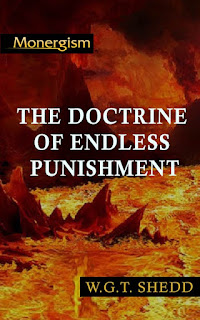W. G. T. Shedd and What is Left
I was talking to the Pastor of a Free Presbyterian Church about my book Wholly Smoke: The Myth of Endless Torment. His first response was "Have you addressed what W. G. T. Shedd said?"
My first knee-jerk reaction was "No, I'm not concerned with what Shedd said, but with what Peter, Paul, John and Jesus said."
He went on to attempt to quote from memory the grave concern Shedd, author of The Doctrine of Endless Torment, expressed about how important the dogma of ongoing agony was to evangelical Christianity and what would happen if it were abandoned.
He didn't quote any Scripture, and he didn't quote Shedd quoting any Scripture. But that is par for the course for those who believe the Reformation ended in 1646 with the Westminster Confession of Faith. Part of the treasured Reformation legacy is Sola Scriptura, the Scriptures Alone, but that's out the window for men who honor men above the Bible.
They are creedal parrots who have no desire to challenge their assumed absorptions by making a Berean search to see if those things are so. Brilliant men whom they revere from four hundred years ago said they're so, so they don't question it, they just repeat it.
I took the opportunity to rapid-fire quote a multitude of Scripture of which I hoped the pastor was familiar, knowing it would make no difference at that moment, but perhaps later when he's reading his Bible he'll come across those same verses which will cause him to think above and beyond his hallowed heroes.
But I was curious to read more of Shedd. Below is the last part of the introduction to his book defending ceaseless suffering. Like his adoring disciple, Shedd also thought it important to emphasize what has been said about the Bible over what the Bible says. Extolling the "liturgies and literature of the church" Shedd quotes from the Litany and Book of Common Prayer, and cites Augustine, Chrysostom, Bunyan, and Baxter.
Shedd: "The destructive nature of the error is still more apparent in practical theology. Could it be proved that the Christian church have been deceived in finding the doctrine of Endless Punishment in the Christian Scriptures, and that there is no such thing, havoc would be made of all the liturgies of the Church, as well as of its literature. Consider the following petition from the “Morning Prayer for Families,” in the book of Common Prayer used in the Episcopal church:
“Keep in our minds a lively remembrance of that great day in which we must give a strict account of our thoughts, words, and actions, and according to the works done in the body be eternally rewarded or punished by him whom thou hast appointed the Judge of quick and dead, thy Son Jesus Christ our Lord.” Suppose, after uttering this petition, the person to say to himself — “There is no eternal punishment.”. Consider, again, that searching and anguished cry from the Litany: “From thy wrath, and from everlasting damnation, Good Lord, deliver us,” and imagine a bystander to say to the soul that has just agonized this prayer: “Thou fool, there is no everlasting damnation.” And the effect of this denial is equally destructive in devotional literature. Take the doctrine of eternal perdition, and the antithetic doctrine of eternal salvation, out of the Confessions of Augustine; out of the Sermons of Chrysostom; out of the Imitation of a Kempis; out of Bunyan’s Pilgrim’s Progress; out of Jeremy Taylor’s Holy Living and Dying; out of Baxter’s Saints’ Everlasting Rest; and what is left?"
I'd like to answer Shedd's last question, "What is left?" What is left is the truth of Scripture that eternal life is only in Christ, and all others will perish, burn up, be consumed, devoured, destroyed, punished with everlasting destruction, die the second death, and be no more. That's not only the teaching of the Bible; it's the very wording.




Comments
Post a Comment
Thoughts?